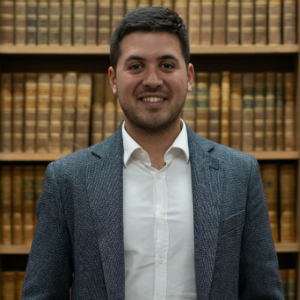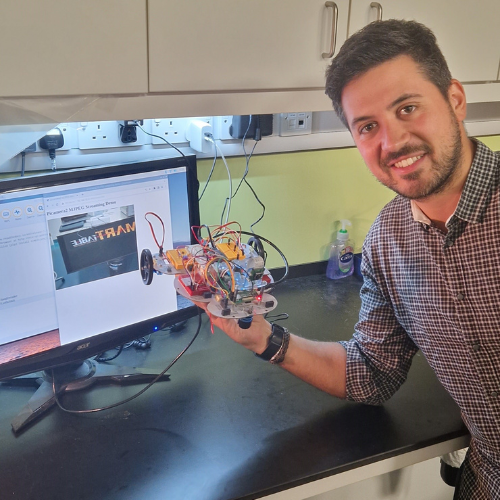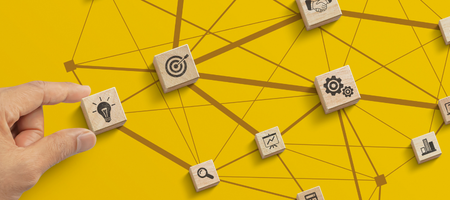
Dr Raffaele Sarnataro, a postgraduate member of The Society from University of Oxford
Dr Raffaele Sarnataro, a postgraduate member of The Society from University of Oxford, received a Professional Development Award of £445 from The Society to attend a neuroscience bootcamp to advance his research in bioenergetic molecular machinery and circuitry network dynamics of sleep-control neurons.
The Professional Development Award provides funding for postgraduate members and full members not yet in a permanent post. It enables a laboratory visit or attendance at a training course for the development of a specific skill or technique to support their current physiology research project, or teaching, and to enhance their academic skills portfolio.
In this blog, Raffaele tells us about his experience and shares how this award will support his current research projects studies and career.
Neuroscience bootcamp
I applied for the Professional Development Award in February 2023 to participate in the Experimental Neuroscience Bootcamp 2023 delivered by the CAJAL Advanced Neuroscience Training Programme.
CAJAL was founded by The Federation of European Neuroscience Societies (FENS) and the International Brain Research Organization (IBRO) to establish a high-level neuroscience training hub in Europe. The aim of the programme is to teach state-of-the-art techniques, data analysis and computer skills to train the next generation of top-notch neuroscientists.
The spirit of the training bootcamp matched one of the ultimate ambitions of physiology, to unveil and “hack” sophisticated black boxes.
Learning modern techniques of experimental neuroscience
We were provided with an actual black box containing a range of electronic components, such as connecting cables, resistors, transistors, sensors, motors, microcontrollers, and microcomputers. We were also given a white board with empty spaces labelled muscles, spinal cord, hindbrain, midbrain, and forebrain. Over the five-day course, we filled those empty spaces by constructing our own intelligent system, a robot.
There were over 100 participants from all over the world. We were taught through a combination of online live and recorded lectures along with hands-on experiments about the physics and logics behind each component. This helped us think how these related to neuroscience concepts and complex physiological systems. The transparency of the systems we were building meant no black boxes, so the robot was fittingly named NB3, short for No-Black-Boxes-Bot.

Building a robot
Our instructions were minimal, which was intentional to give us the freedom for problem-solving and inventiveness. This became more apparent as the complexity of the robot, and its components, increased.
We started with electronics, by building simple circuits on a board using resistors, diodes and transistors to make voltage dividers and simple light or rotation sensors. These circuits represented the spinal cord, which we then connected to muscles, which were our motors. The motors drove movements depending on sensory inputs, such as light intensity.
We then installed Arduino microcontrollers and learnt how to programme them to generate more complex sounds or motor outputs. On the third day, we installed a RaspberryPi (RPi), this acted as a midbrain and was connected to “ears”. This taught us about operative systems and networks, and we worked on the challenges to create functional connections and protocols between the RPi and the microcontrollers. We then focused on digital signal processing for 1-D (audio) and 2-D (image) recognition with an “eye” camera and forebrain face detection algorithm.
For the final part of the course, we could choose how we wanted to customise and complete our robots. My robot would respond to my face and move towards me, trying to centre my face in its field of view, emitting LED flashes and sounds depending on its direction of movement.
Advancing my skills and techniques
Cajal Advanced Neuroscience Training Programme team put together a spectacular course. It equipped me with the knowledge and tools that are essential to create and understand complex experimental equipment that are required for modern physiological studies (and which are often dreaded as black boxes). It was also beneficial to be shown how these draw parallels to the brain architecture.
The pioneering format and course contents had a great balance between the support of lectures and teaching assistants and the time for constructive individual troubleshooting.
I am grateful to The Physiological Society for granting me the Professional Development Award, and its commitment towards training early career physiologists and valuing high-level scientific programmes with other European partners.
The grant gave me the opportunity to train and develop several skills and techniques that will help me design novel neuroscience experiments and equipment, which should benefit my current projects and my future research career.
If you are interested in applying to our next funding round, please visit https://www.physoc.org/grants-and-prizes/grants/professional-development-award/. The next round closes on 22 August 2023.

